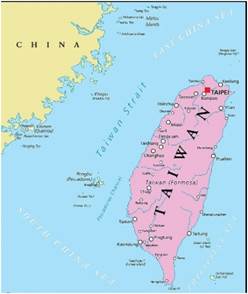TAIWAN STRAIT

Copyright infringement is not intended
Context: India has for the first time referred to what it called “the militarisation of the Taiwan Strait”, marking a rare instance of New Delhi appearing to comment on China’s actions towards Taiwan.
Details:
- The reference to Taiwan, in a statement issued by the Indian High Commission in Sri Lanka, marked a more pronounced expression over the situation in the Taiwan Strait than its previous response on August 12 to China’s military drills.
- These activities were conducted in the wake of the visit by U.S. House Speaker Nancy Pelosi.
- Earlier this month, the Ministry of External Affairs (MEA) did not refer to “militarisation” of the Strait, only saying India was “concerned at recent developments” and “urge[d] exercise of restraint, avoidance of unilateral actions to change status quo, de-escalation of tensions and efforts to maintain peace and stability in the region”.
- When asked at that briefing if India would, as Beijing had requested, reiterate its commitment to a “One China policy”, the MEA said “India’s relevant policies are well-known and consistent” and “do not require reiteration”.
- The latest reference to Taiwan came amid a spat with China over the visit this month of a Chinese military tracking vessel, Yuan Wang 5, to Hambantota in Sri Lanka.
- Responding sharply to remarks made by the Chinese Ambassador in Sri Lanka referring to “aggression” faced by Sri Lanka from its “northern neighbour”, the Indian High Commission termed his comments “a violation of basic diplomatic etiquette”, saying they “may be a personal trait or reflecting a larger national attitude”.
- The High Commission said the statement was “in response to queries concerning the article by Chinese Ambassador to Sri Lanka which, inter alia, drew connection between militarisation of Taiwan Straits and visit of China’s Yuan Wang 5 ship to Hambantota.”
- Earlier this month, Foreign Ministers of the G7 — Canada, France, Germany, Italy, Japan, the U.K., and the U.S. — expressed concerns about China’s military activity in the Strait, referring to “threatening actions” by China and saying there was “no justification to use a visit as pretext for aggressive military activity in the Taiwan Strait”.
One China policy:
- Sri Lanka was among the countries that supported China by reiterating the “One China policy” amid the Taiwan tensions.
- India has followed a “One China policy” since its recognition of the PRC in 1949, and only maintains trade and cultural relations with Taiwan.
- India routinely reiterated this policy until 2008, after which it stopped mentioning it in official statements, a demand that China usually asks of most countries in official declarations.
About the strait:
- The narrow Taiwan Strait has been a frequent source of military tension since the defeated Republic of China government fled to Taiwan in 1949 after losing a civil war with the communists, who established the People’s Republic of China.
- Pelosi’s visit to Taiwan was followed around a week later by a group of five other U.S. lawmakers, with China’s military responding by carrying out more exercises near the island.
- The Taiwan Strait is a 180-kilometer (110 mi)-wide strait separating the island of Taiwan and continental Asia.
- The strait is part of the South China Seaand connects to the East China Sea to the north.
- Former names of the Taiwan Strait include the Formosa Straitor Strait of Formosa, from a dated name for Taiwan; the Strait of Fokien or Fujian, from the Chinese province forming the strait’s western shore; and the Black Ditch, a calque of the strait’s name in Hokkien and Hakka.
https://epaper.thehindu.com/Home/ShareArticle?OrgId=GUAA72GCN.1&imageview=0




1.png)
